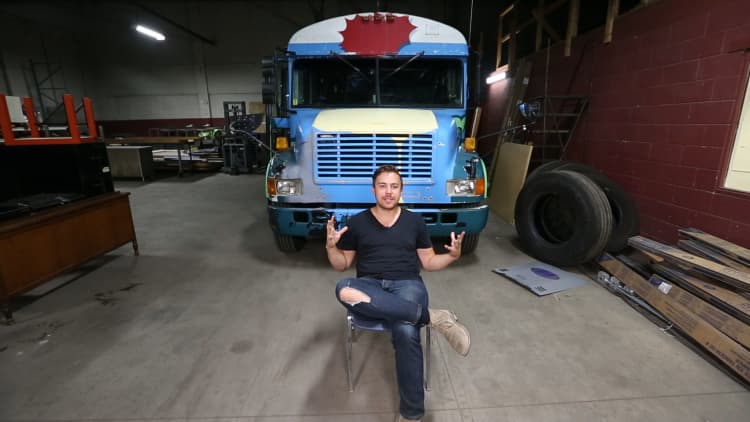Detroit sent shockwaves across the country in 2013 when it made history as the first major U.S. city to file for chapter 9 bankruptcy.
For many Detroiters who saw the writing on the wall, it was a time of exodus — the Motor City's population has fallen every year since the end of the Great Recession, losing its place on the list of the 20 largest U.S. cities for the first time since 1850.
Fewer resources and fewer people downtown created a perfect storm for the city's already poor public transport system, particularly after plans for a solution — a $500 million, 9-mile light rail — were cancelled in 2011.
That was the breaking point for lifelong Detroit resident and serial entrepreneur Andy Didorosi, who had just launched his own automotive shop and business incubator after dropping out of engineering school. "I thought that if we can't figure out this little train, then we're never going to be able to make the rest of the city work," he said. "And so I bought a bus."
Using $2,800 of his own money, Didorosi purchased, refurbished and painted a 1996 used local school bus, with the hope of filling in the gaps left by cancelled routes and city buses that sometimes never showed up.
"We never wanted to compete with the public transit agency," he said, adding that city transportation's subsidies made that impossible. Instead, Didorosi's Detroit Bus Company offered a $5 unlimited daily ride model, targeting underserved areas and hours when city buses didn't run. Within months, the company was serving 200 daily riders and had to purchase a second bus to handle demand.
But for a self-funded project that was looking to expand across all of Detroit to offer a better alternative to a heavily subsidized status quo, the Detroit Bus Company ran into liquidity issues. "There were some weeks where we were down to our last couple hundred bucks and it was like, 'Well, I don't know if we're going to buy the diesel this week,'" Didorosi said.
A nearly $200,000 boost from the Detroit-based, youth-focused Skillman Foundation certainly helped, as the company expanded its goals to include free rides for kids who needed help getting to school and after-school programs. In one school year the business recorded 5,711 free rides for kids in need with a 24-seat refurbished school bus.
"Finding different ways to accomplish what you need to accomplish and using things ... that [others] don't have a use for anymore to do really cool stuff, you know that is the story of the city of Detroit in a nutshell," Didorosi said.
Heading into its sixth year, The Detroit Bus Company has grown considerably since Didorosi operated it himself with the help of a couple drivers. Now, he's joined by a staff of six employees and about 30 drivers handling 11 buses. And even the business model itself has changed.
The company now offers paid tours around Detroit — like Motown history tours, bar crawls and even Pokemon Go tours — where a percentage of each ticket sold goes directly into funding the ride for a kid's after-school program.
"It seems so simple, but with that people now are contributing back to their community by going out and having fun," he said. "Instead of just riders, they're accomplices in this thing. They're helping us grow this into a service that we can hopefully have around for a very long time."



